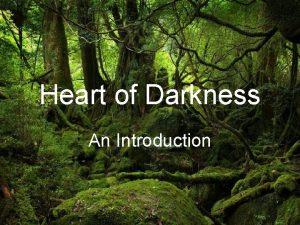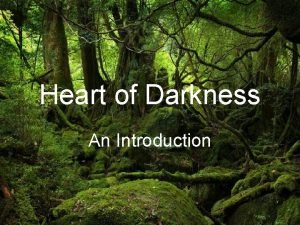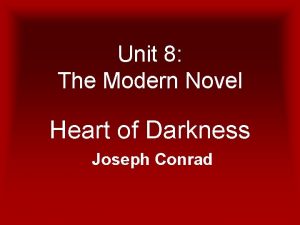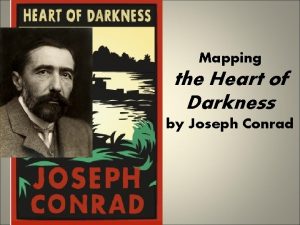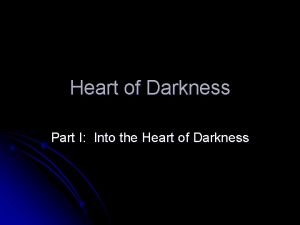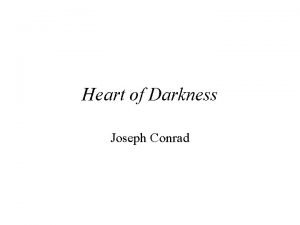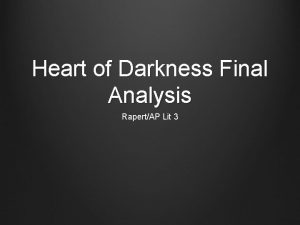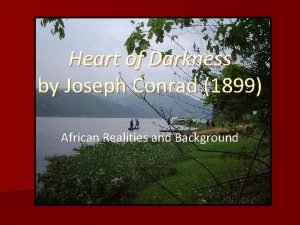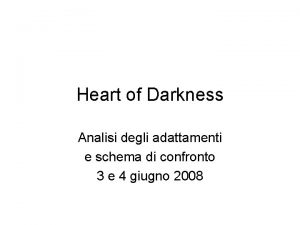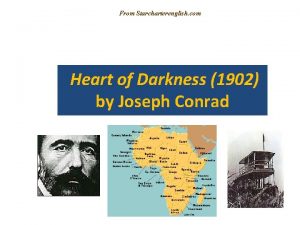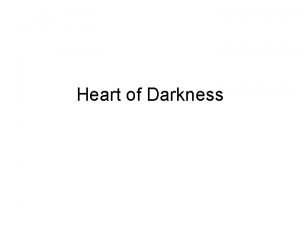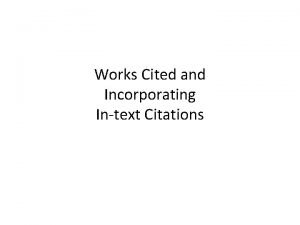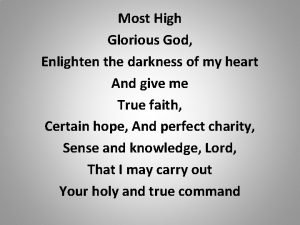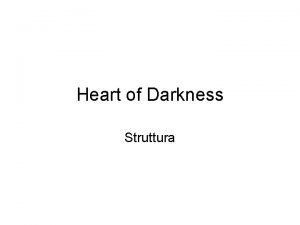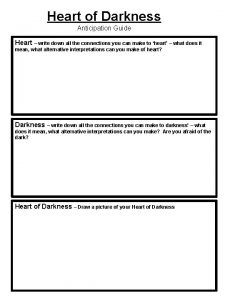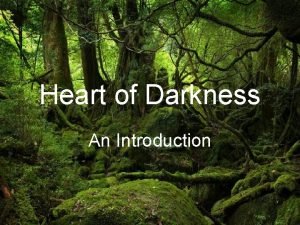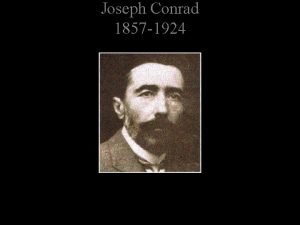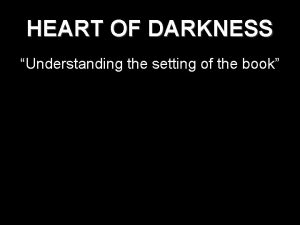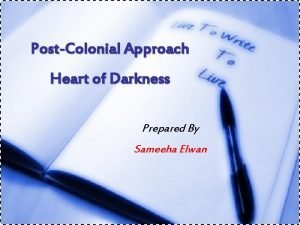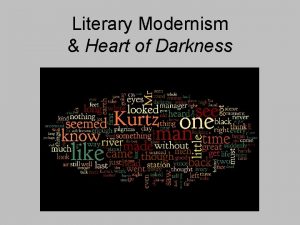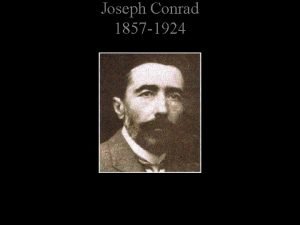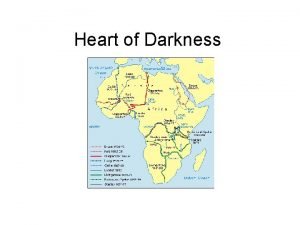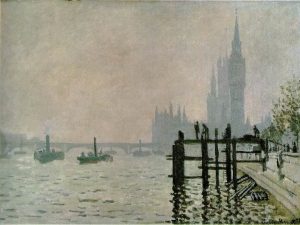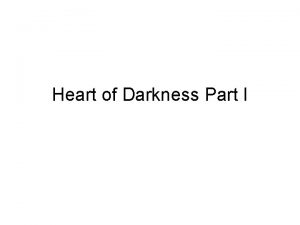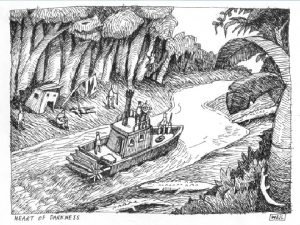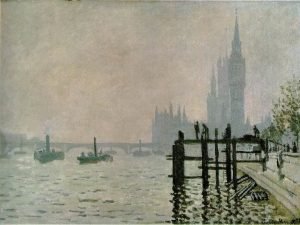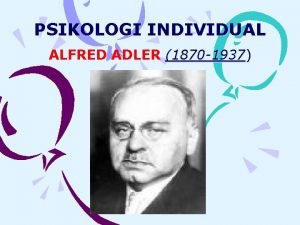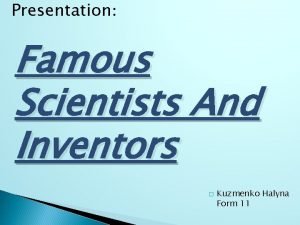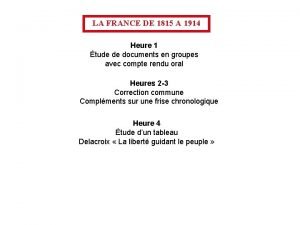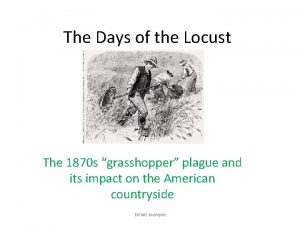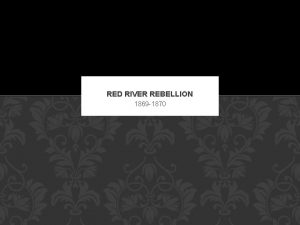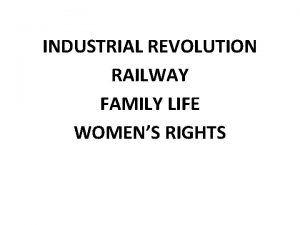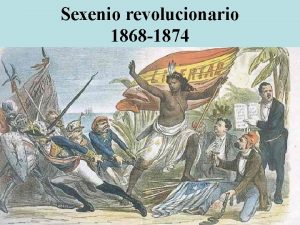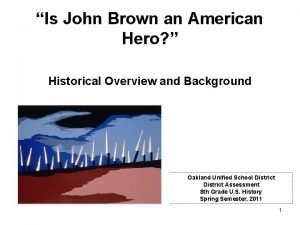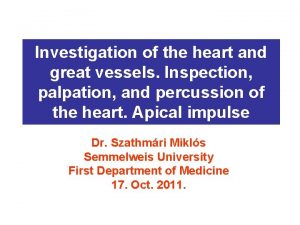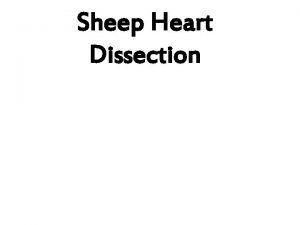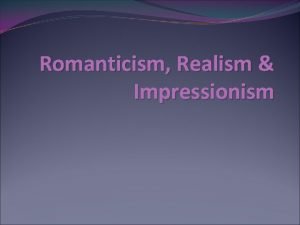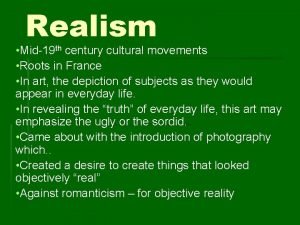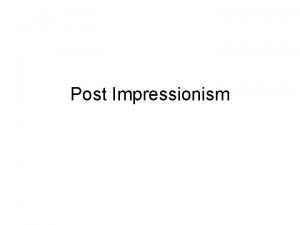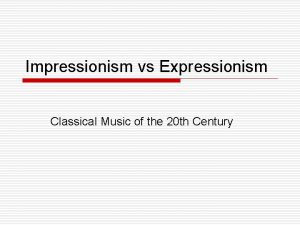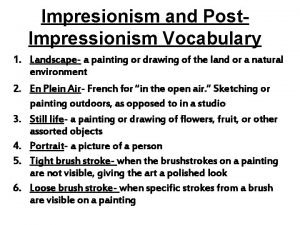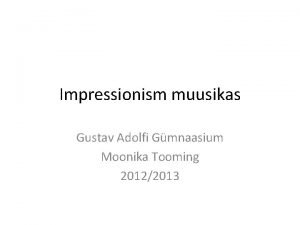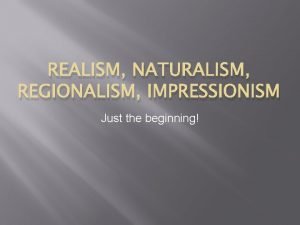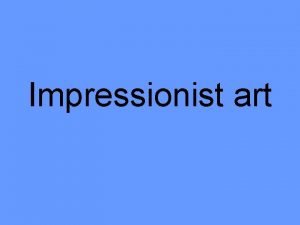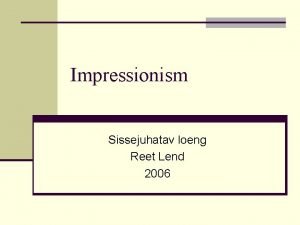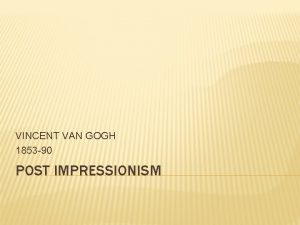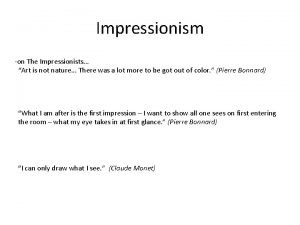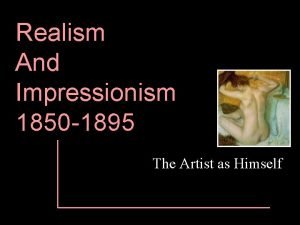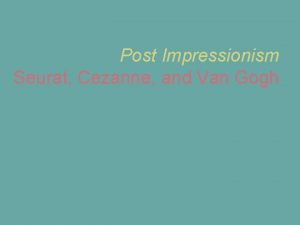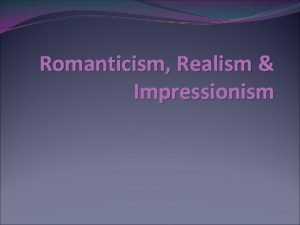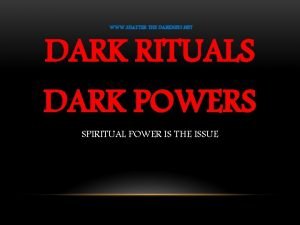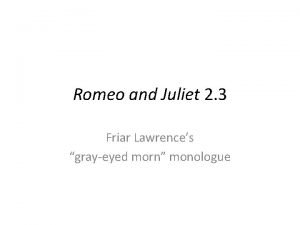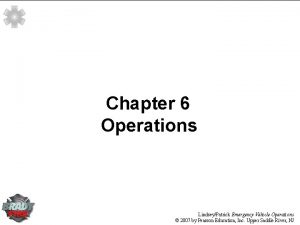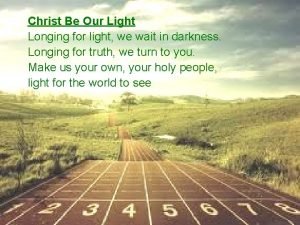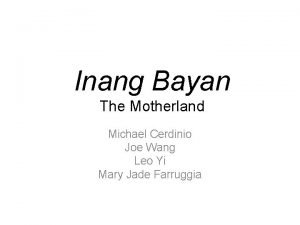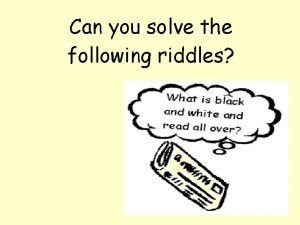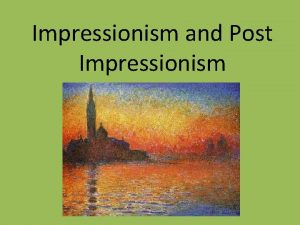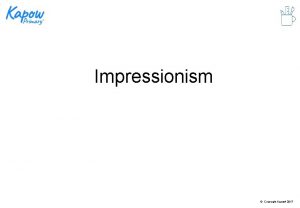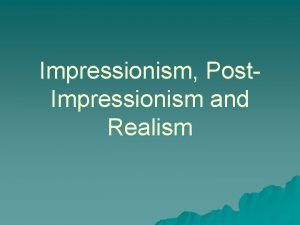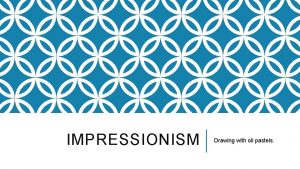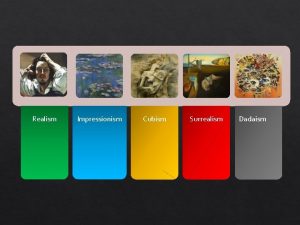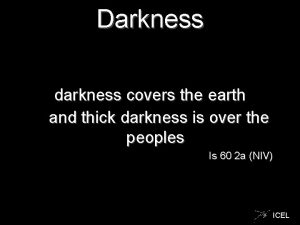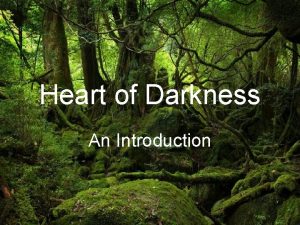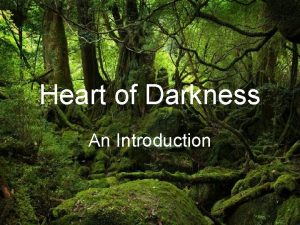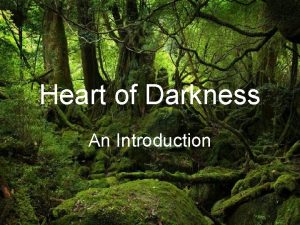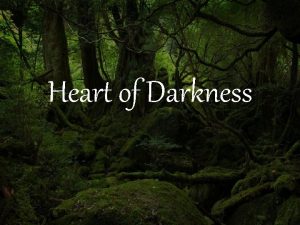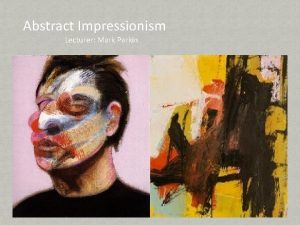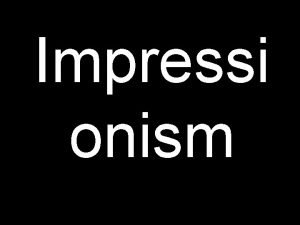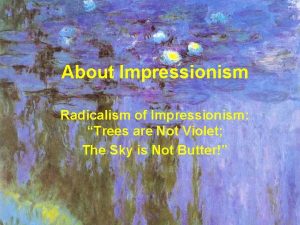Heart of Darkness An Introduction Impressionism 1870 s80


















































































- Slides: 82

Heart of Darkness An Introduction

Impressionism: 1870 s-80 s

What do you notice about this painting and the previous one?

Why are these paintings so blurry?

Ambiguity… • For modernists, the messiness, confusion, and darkness of human experience is interesting. • Rather than trying to simplify and abstract a particular meaning from experience, novelists tend to wallow in the multiplicity of ideas and meanings and sensations that experience can provide.

Ambiguity in Modernist Novels • Novelists of all literary periods attempt to recreate and communicate the rich complexities of human experience itself. • For the modernists, their purpose was to get the reader to re-live an experience, with all its complexity and messiness, all its darkness and ambiguity.

Joseph Conrad & Ambiguity • For Conrad, the world as we experience it is not (at least as we understand it now) the sort of place that can be reduced to a set of clear, explicit truths. • Its truths—the truths of the psyche, of the human mind and soul—are messy, vague, irrational, suggestive, and dark.

Purpose • Conrad wanted to lead his readers to an experience of the “heart of darkness. ” • He was not trying to shed the light of reason on it; instead, he meant to recreate his own experience of darkness so that his readers could feel it, understand, and sympathize. • And why not? Each of us is the owner, too, of a dark and mysterious heart. . .

The Novel… • Since its publication, Heart of Darkness has fascinated readers and critics, almost all of whom regard the novel as significant because of its use of ambiguity and (in Conrad's own words) "foggishness" to dramatize Marlow's perceptions of the horrors he encounters.

• Critics have regarded Heart of Darkness as a work that in several important ways broke many narrative conventions and brought the English novel into the twentieth century. • The book is one of the most widely read and widely written-about novels in the English language.

• Notable exceptions who didn't receive the novel well were the British novelist E. M. Forster, who disparaged the very ambiguities that other critics found so interesting, and the African novelist Chinua Achebe, who derided the novel and Conrad as examples of European racism.

Key Facts • Genre: Novella (between a novel and a short story in length and scope) • Sub-Genres: Symbolism, colonial literature, adventure tale, frame story, & (perhaps) a romance (consider its insistence on heroism and the supernatural and its preference for the symbolic over the realistic)

Key Facts • History: Conrad journeyed through the Congo in 1890. He write the novel in England, from 1898– 1899. Serialized in 1899, then published in book form in 1902, alongside two other stories. • Narrator: There are two narrators: an anonymous passenger on a ship, who listens to Marlow’s story, and Marlow himself, a middle-aged ship’s captain.

Key Facts • Point of View: The first narrator speaks in first-person plural, for himself and four other passengers listening to Marlow’s tale. Marlow then narrates his story in first person, describing only what he witnesses and experiences; he provides only his own commentary on the story. • Tone: Ambivalent: Marlow is disgusted at the brutality of “the Company” and horrified by what has become of Kurtz, but he also claims that any thinking man would be tempted into similar behavior.

Key Facts • Setting: The story opens on the Thames River, outside London, where Marlow is telling the story that makes up Heart of Darkness. The actual events of Marlow’s story take place in Brussels, at the Company’s offices, and then in the Congo, which was then a Belgian territory, during the latter part of the nineteenth century, probably sometime between 1876 and 1892 • Protagonist: Charlie Marlow.

Important Motifs • Alienation & Loneliness • Deception • Order vs. Chaos • Sanity & Insanity • Cruelty & Violence • • • Imperialism Hypocrisy Doubt Ambiguity Corruption Race & Racism

Style • Ironic understatement • Hyperbolic language • Inability to find words to describe situation adequately / failure of language • Images of ridiculous waste • Contrast: – Darkness (very seldom opposed by light) – Interiors vs. surfaces (kernel/shell, coast/inland, station/forest, etc. ) – Upriver vs. downriver – Toward & away from Kurtz – Away from and back toward civilization: (QUEST/JOURNEY STRUCTURE)

Symbolism • • Rivers Fog Kurtz’s Intended Kurtz’s African Woman • French warship • Grove of death • Heads on fenceposts • Kurtz’s “Report” • The “whited sepulcher” of Brussels • The knitting women in “the Company” offices, • The man trying to fill bucket with hole in it.

Order in the Midst of Chaos Heart of Darkness’s Structure • Look for 3’s… – – – 3 parts or chapters Marlow breaks off his story 3 times 3 stations 3 important women 3 central characters • Frame narrative imposes order • Light and Dark, two elements, like yin and yang…

Modernist Qualities of the Novel • An interest in the psychological • Sense that civilization is built upon primitiveness and savagery • Interest in exploring multiplicity and ambiguity • Heavy use of irony

Part One, Section One • What should readers notice about Marlow from the frame narrative? Also, how is he different from the others? • Comparing the Roman conquest of England to the European conquests of colonialism and imperialism.

Part One, Section One • What is meant by the comments on telling a story, with the “kernel” and “the misty halo”? • What does it mean for Marlow to say that the Thames has been “one of the dark places”?

Part One, Section One • Congo river as a “snake” / Marlow as a foolish bird, charmed by it – Snakes as mesmerizing, tempting, evil, dangerous, deadly… Garden of Eden • How does Marlow get his appointment to go to Africa?

Part One, Section One • What happened to Fresleven? – What seems to have “made” that happen? – Who won? Africa or Europe? What does the grass through the bones show?

Part One, Section One • Brussels: “a whited sepulcher” – White outside (say they want to civilize and educate), death and horror within (really want money and power) – Matthew 23: 27: "Woe to you, scribes and Pharisees, hypocrites! For you are like whitewashed tombs which on the outside appear beautiful, but inside they are full of dead men's bones and all uncleanness. • The Company office—what’s the atmosphere like there? • The two women knitting black wool – the fates, guarding the doorway to hell

Part One, Section One • Why does the doctor measure Marlow’s head, and what is his advice for Marlow? What type of journey does all this suggest? • What is Marlow’s attitude toward women? Is it fair? Is there any truth in what he says? • What does he think about the purpose of the company?

Part One, Section One • What does the image of the French steamer firing into the coast suggest about the European presence in Africa and Marlow’s view of it? • How does Marlow seem to feel about the Africans he sees in their small boats, and how does he seem to feel about the Africans being called “enemies”?

Archetypal journey • Marlow's journey parallels the archetypal journey of the hero, as Marlow enters the Congo as an innocent adventurer and leaves as an enlightened individual.

Archetypal journey • The first aspect of Marlow's archetypal journey is the journey through hell. • First, the two "uncanny and fateful" women give each other a "quick glance of unconcerned wisdom, " and he views them as guardians of "the door of Darkness, knitting black wool as for a pall" (Conrad 47).

Archetypal journey • Knitting their black wool and seeming to know the future and to be indifferent, the two women remind us of The Fates, Greek goddesses who decide the destiny of men and who also appear and then write down the record of a man’s life after he crosses the river Styx but before he arrives at the gate to hell.

Archetypal journey • Then, the “door of Darkness” Marlow goes through is like the “Gate of Tartarus, ” the Gate of hell. • The archetypal hero must cross the threshold into hell to continue his journey. Here, Conrad is showing that Marlow's decision to work for the Company is the first step in his trip through hell.

Archetypal journey • Another aspect of the archetypal journey of Heart of Darkness is the journey to the depths of one’s psyche, or “the heart of darkness. ” • After visiting his aunt, Marlow says he "[felt]. . . that [he] was an imposter, " and "instead of going to the centre of a continent, " he felt he was heading "off for the centre of the earth" (50).

Archetypal journey • Marlow sensed that his reasons for going did not fit in with what his aunt believed in or with the Company’s mission. • Instead, he is going to the Congo for adventure and for the purpose of some deeper understanding of self and the world. This is part of the psychological journey.

Part One, Section Two • Just before reaching the Central Station, growing frustrated with his traveling crew, Marlow says, "I felt I was becoming scientifically interesting. ” What are we to make of this statement? • Kurtz’s painting at the Central Station: a blindfolded woman, suggesting lady justice, torch in hand (light in darkness), and yet—her face looks sinister. Why?

Part One, Section Two • At the central station, Marlow accidentally stumbles upon the "grove of death": a shady spot where some of the African people have gone off, sick and dying. Marlow tries to help by giving one a biscuit; but the dying man is too weak to eat it. • The “bit of white worsted" tied around his neck symbolizes the Company's "collaring" of the native people, treating them like animals.

Part One, Section Two Close-read this passage: “I’ve seen the devil of violence, and the devil of greed, and the devil of hot desire; but, by all the stars! these were strong, lusty, redeyed devils, that swayed and drove men —men, I tell you. But as I stood on this hillside, I foresaw that in the blinding sunshine of that land I would become acquainted with a flabby, pretending, weak-eyed devil of a rapacious and pitiless folly. ”

Part One, Section Two • Why is the flabby devil the most appalling one? • What is Marlow saying about the Europeans in Africa? about their motivations? about their mission?

Part One, Section Two • What images of chaos, waste, ineptitude, and/or disorganization can you recall from the outer and the central station? • What is Marlow saying about the European project in Africa?

Part One, Section Two • LIGHT VS. DARK & WHITE VS. BLACK SYMBOLISM – Some critics say Conrad's use of "darkness" to represent evil suggests racism. – Others argue the white characters are actually more dark and evil than the Africans and that Conrad's imagery stresses the hypocrisy of the Company and its employees. They may be “white, ” but they aren’t pure at all.

Part One, Section Two • While trekking to the central station: “the tremor of far-off drums, sinking, swelling, a tremor vast, faint; a sound weird, appealing, suggestive, and wild —and perhaps with as profound a meaning as the sound of bells in a Christian country. ” • He perceives the drumming as strange, yet attractive. He also seems willing to grant that the African people have culture, like the Europeans

Part One, Section Two Character Analysis • Outer Station: – The Accountant • What is remarkable about his appearance and attitude? • How is he like the Company itself? • Central Station: – Why is the manager effective? What does he show about the Company? – Who is the Brickmaker, and what does he show about the Company?

Part One, Section Two Diction Focus • Marlow calls the European agents at the Central Station, the ones waiting for a chance to be promoted to trading posts, “faithless pilgrims. ” • He later describes the members of the Eldorado Exploring Expedition as “sordid buccaneers. ” • What has he decided about the men he’s met so far and their motives?

Part One, Section Two • Kurtz is going to be very important in this story. So far, we know little about him. We do know some things, however. Consider: – How does the Accountant view Kurtz? – How does the Manager view Kurtz? – How does Marlow feel about him so far?

Part One, Section Two • Of Kurtz, Marlow tells his listeners, “He was just a word for me. I did not see the man in the name any more than you do. Do you see him? Do you see the story? Do you see anything? It seems to me I am trying to tell you a dream—making a vain attempt, because no relation of a dream can convey the dream-sensation…

Part One, Section Two • …that commingling of absurdity, surprise, and bewilderment in a tremor of struggling revolt, that notion of being captured by the incredible which is of the very essence of dreams. . ” • He was silent for a while. • “. . . No, it is impossible

Part One, Section Two • …it is impossible to convey the lifesensation of any given epoch of one’s existence—that which makes its truth, its meaning—its subtle and penetrating essence. It is impossible. We live, as we dream—alone. . ” • The failure of language/communication

Part Two, Section One • What do we learn about Kurtz from the conversation Marlow overheard between the Manager and his uncle? – What did Kurtz do that surprised the Manager? – What were Kurtz’s beliefs, which the Manager scoffs at? – Why does the Manager hate Kurtz?

Part Two, Section One • Inability to understand what he sees and hears • Going back into the human past, “first ages, ” “penetrated deeper into the heart of darkness”

Part Two, Section One • Marlow says, “We could have fancied ourselves the first of men taking possession of an accursed inheritance, to be subdued at the cost of profound anguish and of excessive toil. ” Man’s innermost heart, the primitive and subconscious part, is dark, wild, cursed—and in need of taming.

Part Two, Section One • Marlow discusses his sensation of shared humanity with the Africans. • He sees in them a deeper truth, a frankness absent in Europeans, who concern themselves with surface/material truths rather than “giving in” to the allure of darker truths/realities within.

Part Two, Section One • He also says one must be “as much of a man as these [the Africans] on shore” in order to face the truth of the primitive inside all humans. • Work helps Marlow avoid those “creepy thoughts, ” helps him stay connected to the material/the surface rather than diving down deep into man’s dark parts (the id).

Part Two, Section One • How is Marlow both dismissive and appreciative of the African man who had been taught to work the boiler (the “fireman”)? • What is it Marlow likes about the book he finds in the abandoned shack, An Inquiry into some Points of Seamanship?

Part Two, Section One • Marlow wonders whether he should speak with Kurtz and what to say; quickly, however, he decides it does not matter, and says, “The essentials of this affair lay deep under the surface, beyond my reach, and beyond my power of meddling. ” • What does this mean in terms of Marlow’s role?

Part Two, Section One • The fog—sight vs. blindness • The Europeans misjudge the noise coming from the native people. What does Marlow say about the noise? • Marlow emphasizes the unbelievable and admirable restraint of his cannibal crewmen (compare this to European examples of lack of restraint, both so far and later…)

Part Two, Section One • Archetypal quest: “The approach to this Kurtz grubbing for ivory in the wretched bush was beset by as many dangers as though he had been an enchanted princess sleeping in a fabulous castle. ” Kurtz as the grail, princess, or treasure in the typical hero’s story

Part Two, Section Two • With what mixed feelings does Marlow regard his helmsman (the African man taught to steer and be his helper)? • Notice the language of sight, blindness, understanding, and incomprehension during the “attack, ” which, recall, Marlow said was not really an attack at all, but a “protective” and “desperate” attempt to repel the steamer

Part Two, Section Two • “The pilgrims had opened with their Winchesters, and were simply squirting lead into that bush. ” – echoes the futile efforts of the French ship • First, it was impossible to see due to the fog of the land; a short while later, the fog has lifted, but it is impossible to see due to the smoke of the European’s guns. What could this mean?

Part Two, Section Two • The helmsman, unlike the cannibals, lacks restraint; he cannot keep himself “quiet” (meaning calm), and in grabbing the gun (which cannot save him) rather than continuing to steer (which is truly important), he gets himself killed. Think, later, how this is similar to Kurtz’s mistake… • Note that the helmsman is unable to speak, while Kurtz is described as being a voice, above all else. Why?

Part Two, Section Two • Note also that Marlow mourns the helmsman’s death and certainly saw him as a help, a real human individual, and worthy of life. • Marlow even says, later, "I am not prepared to affirm the fellow [meaning Kurtz] was exactly worth the life we lost [meaning the helmsman] in getting to him [Kurtz]. "

Part Two, Section Two • What happened to Kurtz out in that wilderness? Why? • “All Europe contributed to the making of Kurtz”—his ideas were the ideas of Europe at the time • What were the ideas of Kurtz’s original report, and what did he tack on at the end, much later? • What does that postscript mean? • Why the focus on Kurtz’s voice and his words?

Part Two, Section Two • The red-haired man is described as being bloodthirsty and yet nearly fainted at seeing the helmsman’s body. Then Marlow says the pilgrims didn’t hit anything because they shot without aiming, eyes shut. What is he saying about the Europeans in Africa? About the European project itself, in Africa?

Part Two, Section Two • Take note: the native people shoot very small, ineffectual arrows at the steamer. They are more a warning (their intent is to scare the foreigners away) than an attempt to inflict damage or death. • Again, the Europeans misinterpret the native people’s intentions. • Why did the whistle frighten the native people away?

Part Two, Section Two • The “Harlequin” (the Russian) says of Kurtz, “You don’t talk with that man— you listen to him, ” and “this man has enlarged my mind. ” • Kurtz is presented as some sort of guru; he seems to have some power of fascination through his voice and ideas. The harlequin is naïve though; a fool/clown. Will Marlow be drawn in, too? Or not? He is far more cynical than this young man…

Part Two, Section Two • Marlow briefly mentions Kurtz’s fiancée and then says of her, “Oh, she is out of it—completely. They—the women, I mean—are out of it—should be out of it. We must help them to stay in that beautiful world of their own, lest ours gets worse. Oh, she had to be out of it. You should have heard the disinterred body of Mr. Kurtz saying, ‘My Intended. ’ You would have perceived directly then how completely she was out of it. ”

Part Two, Section Two • When one is away from the familiar civilizing influences of home, how does one avoid giving in to the temptations of savagery? • Marlow says, “you must fall back upon your own innate strength, upon your own capacity for faithfulness. […] we must put up with sights, with sounds, with smells, too, by Jove!— breathe dead hippo, so to speak, and not be contaminated…

Part Two, Section Two • …And there, don’t you see? Your strength comes in, the faith in your ability for the digging of unostentatious holes to bury the stuff in—your power of devotion, not to yourself, but to an obscure, backbreaking business. ” • What is he saying?

Part Three Heart of Darkness

The Harlequin • What’s up with the Harlequin (Russian)? Marlow seems to resist being identified with him. • He paints the Russian as naïve: “I did not envy him his devotion to Kurtz … He had not meditated over it, ” and he says the man was “Kurtz’s last disciple, ” seeming to say that he, himself, was not a disciple of Kurtz…

• However, Marlow is much like the Harlequin: drawn to adventure, drawn to Kurtz, tied to Kurtz by bonds of loyalty and respect, and more of a disciple than he will admit —he does loyally take care of Kurtz’s last effects, defend him as remarkable, and visit his fiancée.

Archetype • The Harlequin could represent one stage of Marlow’s journey into the underworld and back; he cannot go back with Marlow on the steamer for that reason. He represents the stage of initiation—going out into the world and seeing the truth of universality; the next stage is to come back and tell the tale, as Marlow does…

Another Frame of Reference • Also, the Harlequin is an example of another way to conduct oneself. He is a humane and decent person. • Readers can view him as an alternative frame of reference, provided by Conrad, by which readers can judge the actions and opinions of the other characters, including Marlow.

• The Harlequin pays back his debt to Van Shuyten, is immune to the greed corrupting “civilized” Europeans in Africa, only uses his guns to feed himself and the natives, nurses Kurtz despite great danger to himself, will not participate in the weird god-stuff Kurtz is doing, and learns the native’s language. Decent, right?

Hollow Kurtz • Kurtz is described in part three as being “hollow at the core. ” Are the other Europeans similarly hollow? Consider: why are they upset about Kurtz’s “methods”? • Kurtz is also described as looking like an image of death carved in ivory, mouth gaping as if to swallow everything. Why state it that way?

Kurtz & Nihilism • For Kurtz, there were no guiding rules in the jungle; he couldn’t restrain himself alone and so acted horrifyingly. Does this relate to nihilism, hollowness, and the “death” of God? • Re-read the part where Marlow confronts Kurtz as he crawls back if you want to think more about this.

Kurtz & Belief • In the end, Kurtz does something that makes him remarkable in Marlow’s eyes. What is it? • Note that after Kurtz says/does this, Marlow respects him in a way; he is then loyal to Kurtz, as opposed to being loyal to the manager. Why?

“The Horror” • So, Kurtz judged (himself? ) with these words: “The horror!”, and Marlow calls those words “an affirmation, a moral victory”—because they represent a frank statement of truth.

“The Horror” / The Intended • Describe the Intended’s home, appearance, and words. • If truth is good, and lies are death, then why does Marlow lie to the Intended about Kurtz’s final words? What is his reasoning? What is her role in the novel? • Is his lie good or evil? • Is it even a lie?

One Interpretation… • Marlow says the Intended had a “mature capacity for fidelity, for belief, ” and he calls “the faith that was in her” “that great and saving illusion. ” • Is he doing good by allowing her to preserve all that? Is having a definite belief, even if it’s not true, better than nihilism and despair?

Archetypal Journey • Why does it matter that Marlow sickens and nearly dies? • What bothers Marlow about the everyday people he encounters back in Brussels? They are materialists… how is he different now? What does this show about his journey?

The Ending • What does it mean that, in the very end, the “tranquil waterway” of the Thames seems “to lead into the heart of an immense darkness”? • Why is Marlow described as sitting “in the pose of a meditating Buddha”? Has he reached enlightenment through his journey?

“Darkness” • Often, light stands for knowledge/truth, and dark stands for ignorance/illusion. • We’ve discussed the “darkness” and the “horror” as being the mystery, brutality, and emptiness within man’s heart, but do not forget that it can also represent lies and ignorance.

“Civilized” • This novel blurs the line between the so-called “advanced” and “civilized” societies of Europe and the so-called “primitive” and “savage” societies in Africa. • In many ways, Conrad suggests these distinctions are invalid, false, and even ridiculous.
 Impressionism in heart of darkness
Impressionism in heart of darkness Impressionism vs post impressionism
Impressionism vs post impressionism Heart of darkness historical context
Heart of darkness historical context Heart of darkness as a modern novel
Heart of darkness as a modern novel Central station heart of darkness
Central station heart of darkness Heart of darkness symbol
Heart of darkness symbol Heart of darkness part 2 summary
Heart of darkness part 2 summary Heart of darkness summary
Heart of darkness summary Heart of darkness deaths
Heart of darkness deaths Heart of darkness
Heart of darkness Heart of darkness analisi
Heart of darkness analisi Heart of darkness theme
Heart of darkness theme Heart of darkness pages
Heart of darkness pages Heart of darkness part 2 summary
Heart of darkness part 2 summary Heart of darkness cambodia
Heart of darkness cambodia Heart of darkness mla citation
Heart of darkness mla citation O most high and glorious god
O most high and glorious god Tim roth heart of darkness
Tim roth heart of darkness Heart of darkness shmoop
Heart of darkness shmoop Modernism in heart of darkness
Modernism in heart of darkness Heart of darkness quotes racism
Heart of darkness quotes racism Setting of heart of darkness
Setting of heart of darkness Edward said two visions in heart of darkness
Edward said two visions in heart of darkness Heart of darkness modernism
Heart of darkness modernism Rivets heart of darkness
Rivets heart of darkness Impressionistic writing
Impressionistic writing Heart of darkness map
Heart of darkness map Map of heart of darkness
Map of heart of darkness Heart of darkness motifs
Heart of darkness motifs Heart of darkness part 2 analysis
Heart of darkness part 2 analysis Heart of darkness lesson plans
Heart of darkness lesson plans Journey without maps graham greene
Journey without maps graham greene Contoh striving for superiority
Contoh striving for superiority Maria montessori birth and death
Maria montessori birth and death Halyna kuzmenko
Halyna kuzmenko Frise chronologique 1815 à 1870
Frise chronologique 1815 à 1870 Frise chronologique de 1815 à 1870
Frise chronologique de 1815 à 1870 1870 locust plague
1870 locust plague 1870
1870 Over land by rail’, gustave dore, 1870
Over land by rail’, gustave dore, 1870 Rey de españa entre 1870 y 1873
Rey de españa entre 1870 y 1873 Strengths and weaknesses of the forster act 1870
Strengths and weaknesses of the forster act 1870 John brown the martyr currier and ives 1870
John brown the martyr currier and ives 1870 Dullness of heart
Dullness of heart Superior vena cava pig heart
Superior vena cava pig heart Heart to heart merrylands
Heart to heart merrylands Romanticism realism impressionism
Romanticism realism impressionism Roots cultural movement
Roots cultural movement Post-impressionism characteristics
Post-impressionism characteristics Impressionism vs expressionism music
Impressionism vs expressionism music Expressionist vs impressionist
Expressionist vs impressionist Impressionism characteristics
Impressionism characteristics Impressionism 1867 to 1886
Impressionism 1867 to 1886 Impressionism (1865–1885)
Impressionism (1865–1885) Impresionism
Impresionism How did renoir glamorize his clientele
How did renoir glamorize his clientele Characteristics of post-impressionism
Characteristics of post-impressionism Post impressionism slideshare
Post impressionism slideshare Impressionism muusikas
Impressionism muusikas Impressionism vs naturalism
Impressionism vs naturalism Van gogh self-portrait (1889)
Van gogh self-portrait (1889) Impressionism vocabulary
Impressionism vocabulary Reet lend
Reet lend Van gogh post impressionism
Van gogh post impressionism Impressionismus mindmap
Impressionismus mindmap French impressionism in film
French impressionism in film Manet paintings
Manet paintings Cezanne pointillism
Cezanne pointillism Romanticism realism impressionism
Romanticism realism impressionism Montgomery bus boycott apush
Montgomery bus boycott apush Introduction of heart
Introduction of heart Introduction of heart
Introduction of heart Shatterthedarkness.net
Shatterthedarkness.net Who breaks the power of sin and darkness
Who breaks the power of sin and darkness The grey eyed morn smiles on the frowning night
The grey eyed morn smiles on the frowning night Fantasy by gwendolyn bennett analysis
Fantasy by gwendolyn bennett analysis Darkness conceals hazards such as
Darkness conceals hazards such as The relative lightness and darkness of surfaces.
The relative lightness and darkness of surfaces. Who breaks the power
Who breaks the power It brings together a composition with similar units.
It brings together a composition with similar units. Longing for light we wait in darkness
Longing for light we wait in darkness Light and darkness by emilio jacinto
Light and darkness by emilio jacinto I run over fields and woods all day
I run over fields and woods all day
